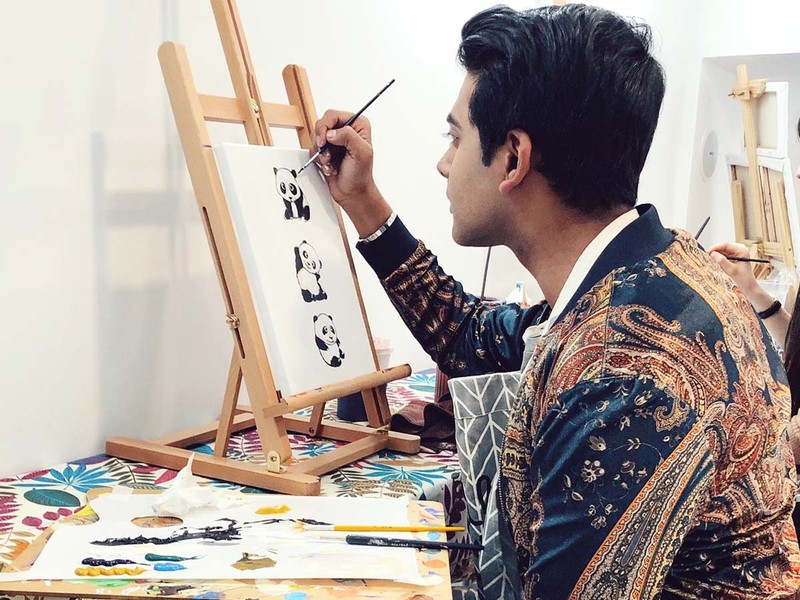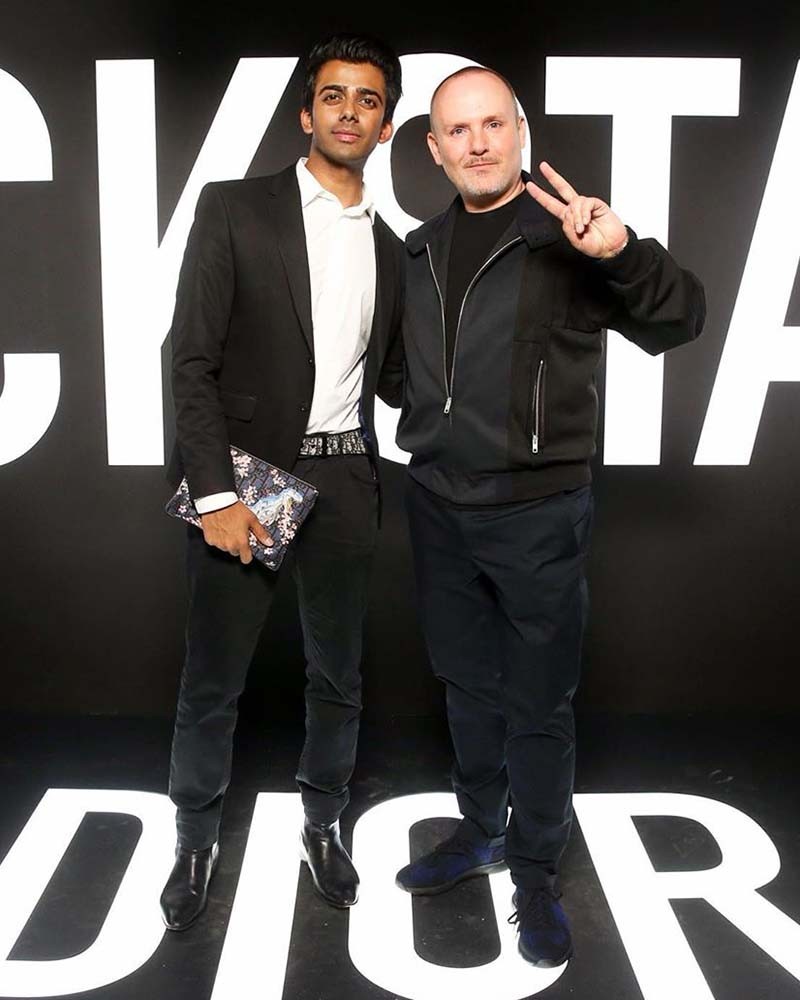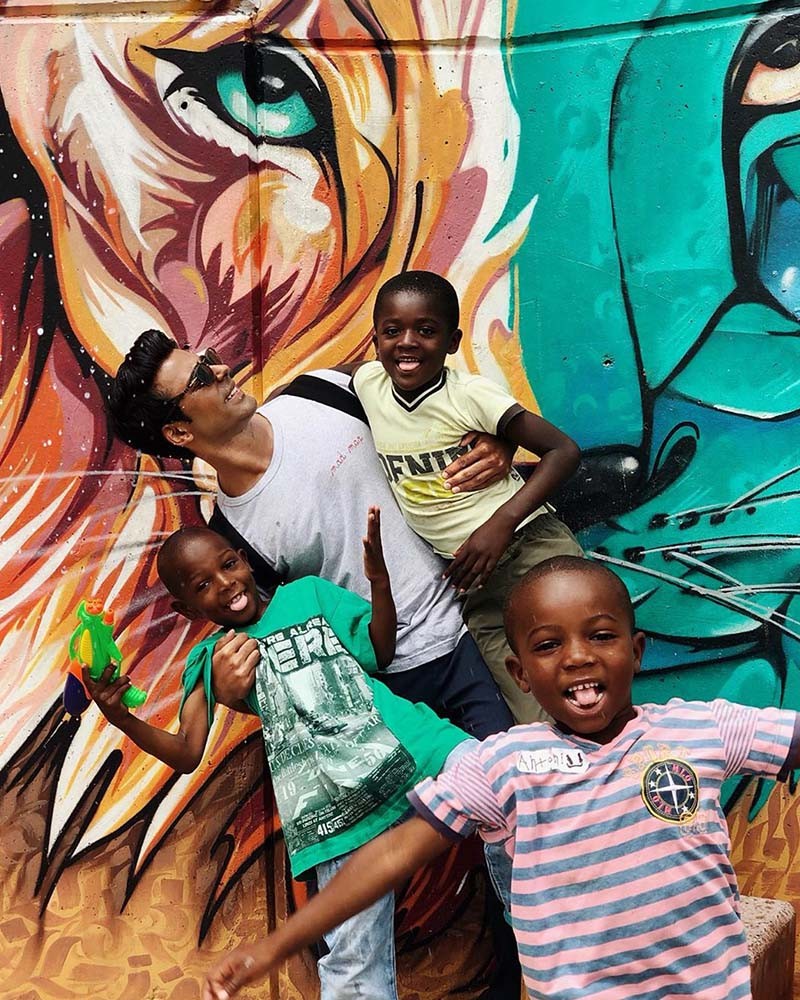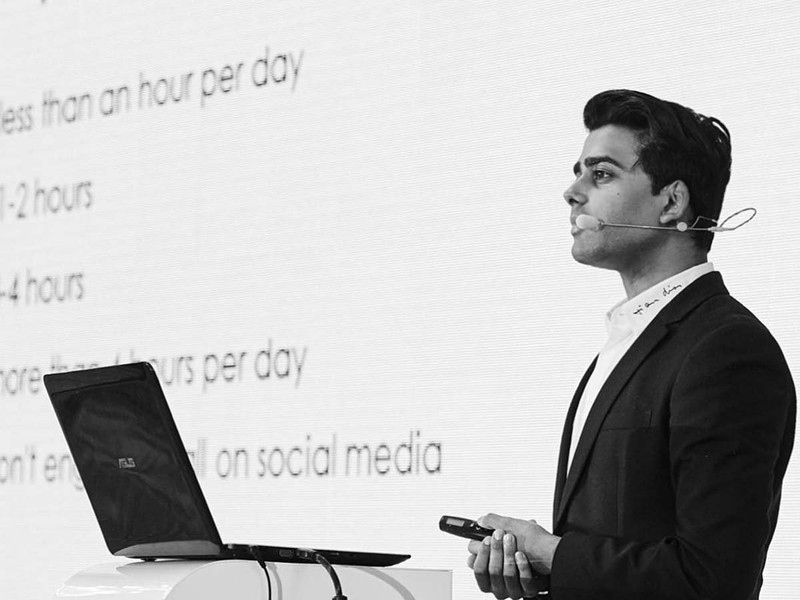How I Made It: Akash Mehta
Not too many electrical engineering undergraduates end up running haircare brands, Akash. Was it an obvious transition for you?
In some ways! My father’s been an entrepreneur in the beauty industry for 40 years. He used to take me to board meetings from a very young age. I’d sit in the corner, just listening, so in that sense I was trained in entrepreneurship – and beauty – without realising it.
At school, though, I was a studious type – if I wasn’t studying in class, I was doing extra tuition. I was good at maths and physics, so an engineering degree made sense. When I got to university, I struggled. I went from being a grade-A student to failing my second year. It was quite a reality check. I realised I needed to do something I enjoyed and was passionate about, because those are the things you put time and effort into. While I was waiting to retake my second-year exams, my dad got me an internship doing digital marketing at Burberry. I loved the mix of digital and beauty so, from then onwards, I said no more engineering.
What was it about digital that excited you?
While I was at university, I also did a bit of music. I was a singer, going into studios and trying to get signed properly with Sony. To do that, I was told I needed a social media presence. That’s when I built up a following online – one or two songs got to a million plays – and that experience gave me something different when I got a job at Estée Lauder. They’d never had an employee with 200,000 followers before, who could be an influencer from within the company.
Was the goal always to start something of your own?
I was never in a rush to be an entrepreneur. I always said, let’s see where this journey takes me. I knew I needed to learn and train, so I worked at Dior for three years. At the same time, my sister was working with my dad on little side projects. More of them failed than succeeded, but there was one about creating a beard oil, that turned into creating a hair oil, that got us thinking. India and hair go together – something like 90% of the world’s wigs are made in India – but there’s no big Indian brand in the haircare market, nothing like Morocco has with its argan oil.
And that’s what prompted you to strike out with Fable & Mane?
That was the business reason. I always think there are business and personal reasons for doing something. The personal reason here was to create something that contained our childhood memories of our grandma and the hair oil she made for us.

What gave you the confidence to quit a secure job you were doing well at?
I wasn’t the kind of entrepreneur to quit everything and start working from his garage. I spent a year and a half building Fable & Mane while I was still at Dior. We managed to get Sephora interested – we sent them some samples and a LinkedIn message, told them we were coming to San Francisco and a junior buyer got excited about our product. They liked the concept and invited us to the office. Later, having worked on building the brand with Sephora, they were preparing to stock us and that’s when I was ready to leap across and become full-time CEO.
Did you have a strategy for making the most of the opportunity?
There wasn’t a business plan as such. At the outset I knew I would have to learn a lot on the journey. Having had that failure at university, which had turned into this opportunity, I had an attitude that I would embrace failures and learn from them. I also had a pragmatic approach of surrounding myself with mentors and people I trust. Being an entrepreneur can be lonely and tough, but I had my dad as a mentor and my sister alongside me. I’m good at teambuilding, finance and digital – with my digital expertise, I knew we could take the brand to a global level quickly. My sister’s the creative one with the vision for the product. We work well together, and not having a business plan also meant we were quite agile. We could respond quickly to anything that happened in fast-changing digital and retail landscapes, as well as the pandemic.
How did the pandemic change things?
We launched at the height of the pandemic. In the short term, there were a lot of events we had to cancel. With the world coming to a halt, there have also been supply issues, of course, and it’s not been easy dealing with extra costs as a start-up trying to increase production quickly. Retailers have been very understanding, though – they recognise everyone’s in the same boat. And in another way, the pandemic has helped us from a business perspective. People couldn’t go to salons, so they invested more in at-home rituals, which is what we are all about.


What is your digital expertise exactly?
Digital is what I’d trained in for five or six years with big brands like Estée Lauder. I was an ‘intrapreneur’ for those companies, helping them to make digital ROI less of a grey area. I was putting numbers behind everything, asking: how do we make digital presence convert into sales? Going into Fable & Mane, everything we did in digital was tested in the playground of big corporations with the big budgets they have. I also have my own digital brand agency, which works with the likes of L’Oréal, that we could leverage. From affiliate marketing and checkout codes to working out which social media platforms to use and the best types of content for them, we knew what worked so we could skip a lot of that testing. The business today is pretty much dependent on social media and digital sales, with influencers the biggest factor in growing it.
Was there a particular moment when you realised Fable & Mane was becoming successful?
From a business perspective, it was when we went viral on Tik Tok last year. Suddenly we were getting six figures of sales in a day. That showed me where the business could be and how we could get it there. From a personal perspective, there was a moment during a team call. I hadn’t realised how many people we had in the team from all over the world, all types of backgrounds and ethnicities. This wasn’t a goal – it was organic – but we had built something amazing in one year.
What are the natural attributes that have helped you make a success of Fable & Mane?
I listen to my team and I build my team just as I bring up myself. I leave the ego at the door, put the company first and make sure everything is done in the best interests of the company not me as CEO. When you listen to the business, you learn what sticks and what doesn’t. You can move your budget accordingly. Some people just try a lot of different things, but don’t listen to the outcomes. As I mentioned before, I’m also able to pick myself up quickly from mistakes and learn from them. Turning today’s failure into tomorrow’s success is really important.
What are the attributes you’ve had to pick up along the way?
I’ve had to learn a lot about growing an international team of different types of people from all over the world. I was fortunate in my corporate career that I always had small teams that worked well. With Fable & Mane I’ve had people in my team I’ve had to fire, I’ve had some that needed more training than others. Navigating that has been a learning process. I’ve also had to learn that what we need today is not necessarily what we need tomorrow. It’s been a shock how quickly the industry and the market move today, especially with the digital acceleration driven by the pandemic. I have to come in every day with a fresh mentality. I’ve got to be always learning and never comfortable. I might be considered a digital expert, but I’m never afraid to ask for help or advice.
How have mentors helped you?
They are sounding boards, therapists and life coaches. Sometimes they are a pair of ears so I can decide my own path. Sometimes they audit what we’re doing and ask relevant questions. Sometimes they give me really tangible feedback or help, like a connection to a retailer. They are my inspiration as well. I’m a young person in relatively senior positions. Having mentors who are CEOs is a bit like sitting at the cool kids’ table. It motivates me.

Is there anything else that’s helped you along the way?
Micro-practices! Being entrepreneurial means working all the time and it can be lonely. Micro-practices like 15 or 30-minute morning workouts or micro-meditations keep me going. Even if you love what you do like I do, you need these little micro-practices to make everything sustainable.
It sounds pretty full on. Are you enjoying the job at the moment?
Definitely. I love working. I feel guilty calling it ‘work’. It’s not laborious; it’s something that brings me joy. I suppose another thing I’ve had to learn along the way is to respect boundaries. I’ve had to force myself to put the laptop down, not obsess over emails. I also force myself to watch an hour of Netflix, just to switch off every day. But right now, I’m young, I have energy, so now’s a good time to work.
Is it the joy that motivates you? Or something else?
Business wise, we have targets to motivate us. I have a podcast where I interview the founders of beauty brands. Some of them have revenues in eight or nine figures. That’s a motivation! Personally, though, the motivation is to get Fable & Mane into people’s homes and showers around the world. I want them to enjoy the product and also the narrative of us doing some good in the world. We have The Fable Fund, which works to protect tigers in the wild. My grandma has passed away and I also like to see her legacy continued. We’ve had the Kardashians and Bella Hadid loving our products – her legacy – in their showers. Those moments excite me.
What happens next, Akash? Are you a serial entrepreneur?
If you had asked me this a few weeks ago, I was definitely a serial entrepreneur. I was already building a couple more businesses and brands, but I’ve actually just closed my other projects so I can just focus on Fable & Mane and international expansion. I might move to America for a few months next year and work on that side of the business. We’re also looking at the Middle East, Asia, Australia. But I also want to enjoy life a bit as well. I’m in my 20s, I’m single and I want to start dating.
Eventually I’d like to build an incubator, accelerator or fund. That way I can be a serial entrepreneur, while helping others in a funding or consultancy kind of way, as opposed to spending day and night brand building myself. I only have energy for one Fable & Mane.
Finally, then, have you got a vision of where Fable & Mane is headed longer term?
Actually I’ve got fewer goals for the business than before. I used to have specific goals, we’d hit them and then I’d wonder if it was all worth it. I’ve realised life is to be lived in the moment and that happiness doesn’t come from hitting goals. I can say I want Fable & Mane to be as big as it can be. Maybe one day I’ll sell it – do a Drunk Elephant type deal – but maybe I’ll keep running it. I’m open to the journey wherever it goes.
AKASH’S 3 TIPS FOR AN ASPIRING ENTREPRENEUR
- Have a co-founder
A co-founder can be one of the best things about your business. You are going to need people – and advice – on your journey. Don’t try to do everything yourself. Find a co-founder whose skills complement your own park your ego at the door. You can make the final decision, but you want strong people around you giving the best advice.
- Get a CFO early
You want a financial director as soon as possible for two reasons. First, they’ll make sure your numbers and your margins are right. Second, your books will be clean from day one if you ever want to sell or get investment.
- Be involved
As a founder, be present at everything in the early days. Be on every single call – to suppliers, retailers, whoever – and in every single meeting. This is the best education you can get. Once you have that, delegate out. Don’t micro-manage. Build your team and let them do the rest.
To find out more about Akash’s business, head to FableAndMane.com
DISCLAIMER: We endeavour to always credit the correct original source of every image we use. If you think a credit may be incorrect, please contact us at [email protected].


